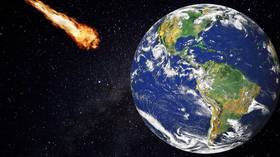Asteroid so large it has its own moon set to whizz by Earth this weekend (VIDEO)

A ‘potentially hazardous’ asteroid, so large it has its own moon, is hurtling towards Earth at some 48,000 kilometers per hour. The good news is that it’s expected to pass safely, at about 5 million kilometers of us.
Asteroid 1999 KW4 was first discovered two decades ago. It orbits the Sun once every 188 days, passing between the orbits of Venus and Earth as it goes, and is due to make its closest approach to Earth at 23:05 UTC on Saturday.
Classified as a Near Earth Object, the 1.5-kilometer wide asteroid is expected to zip by Earth without causing any harm, though the Minor Planet Center has labelled it ‘potentially hazardous.’ Its companion moon is about half a kilometer wide.
Also on rt.com From nuclear warheads to gravity tractors, how well are we prepared for an impending asteroid?Although not visible to the naked eye, keen astronomers equipped with a telescope should be able to clap eyes on the speeding space rock over the next few days. At its closest point to Earth, the asteroid will be about 13 times the distance between our planet and the Moon.
This NASA video marks the asteroid’s path in yellow as it travels through our solar system.
EarthSky notes that this is the biggest asteroid to come so close to Earth for another decade; the next such close encounter is not expected until June 2027.
Also on rt.com NASA and emergency planners training to tackle impending asteroid strikeLike this story? Share it with a friend!













